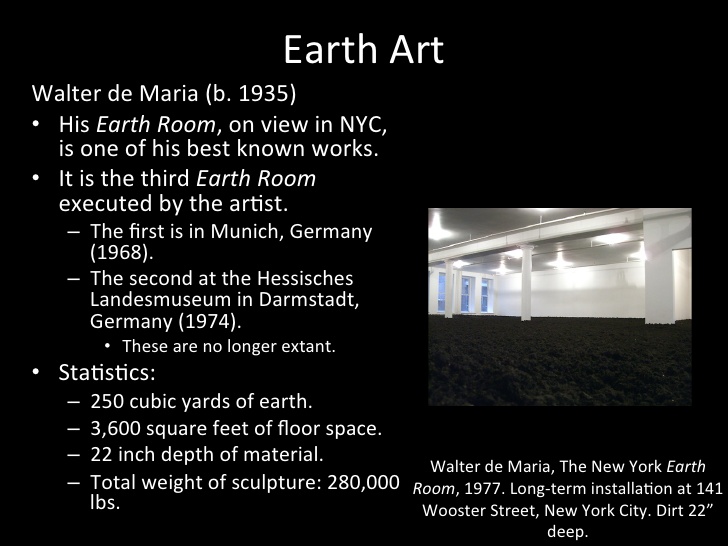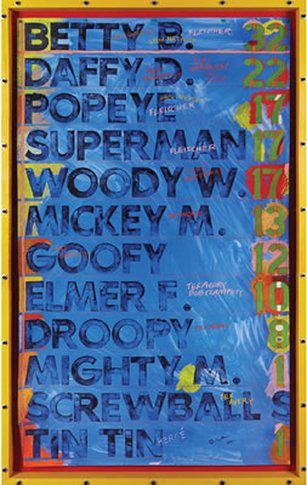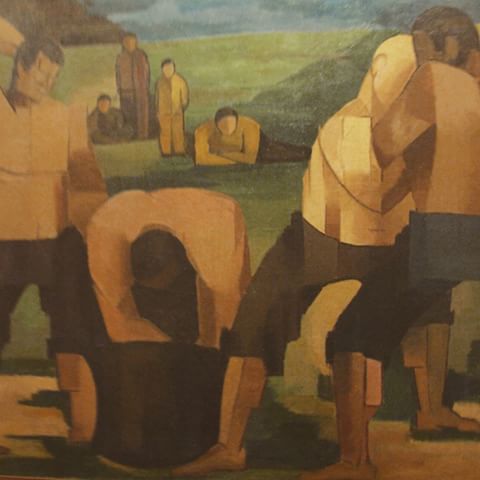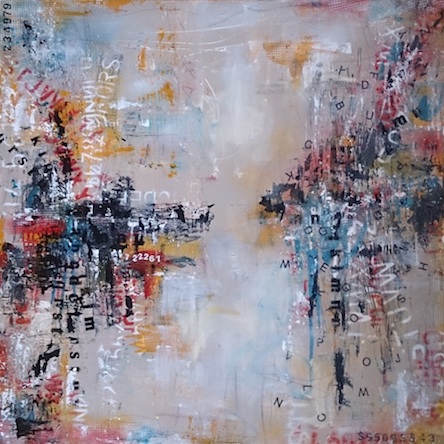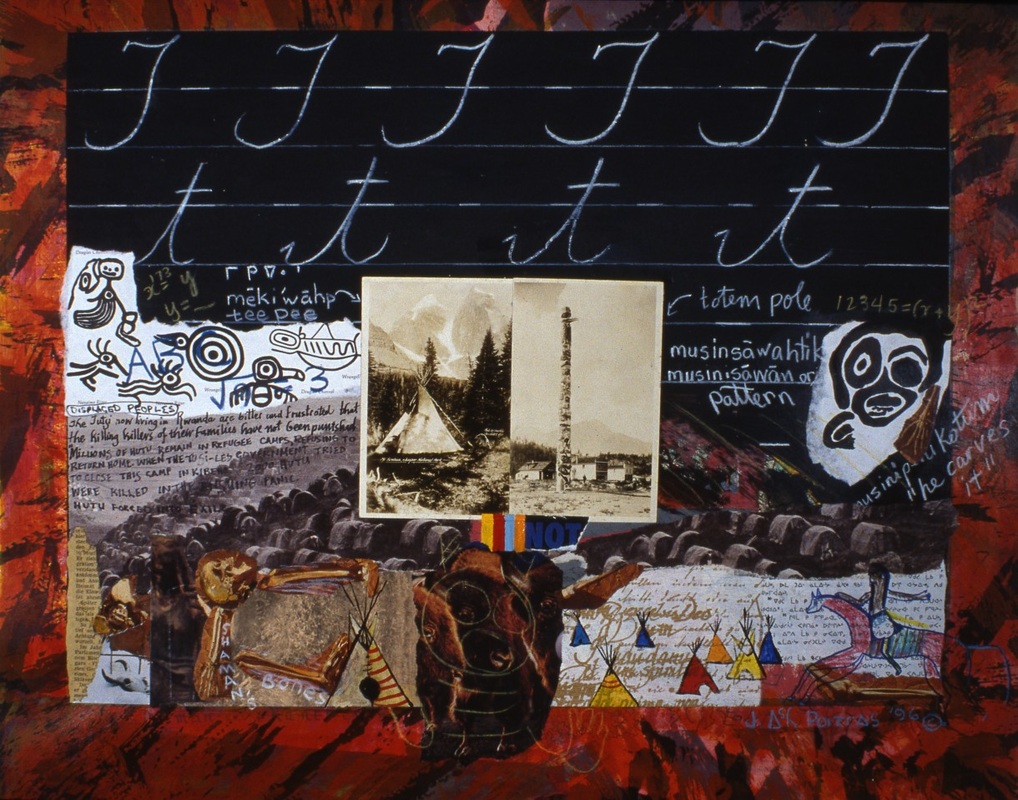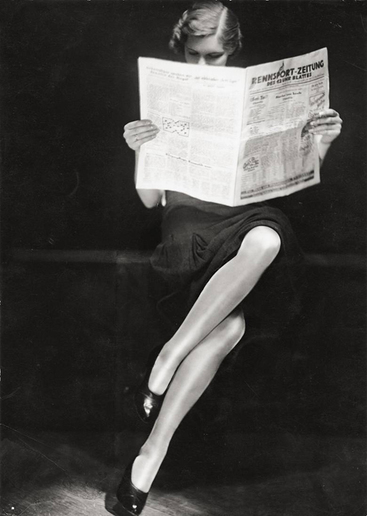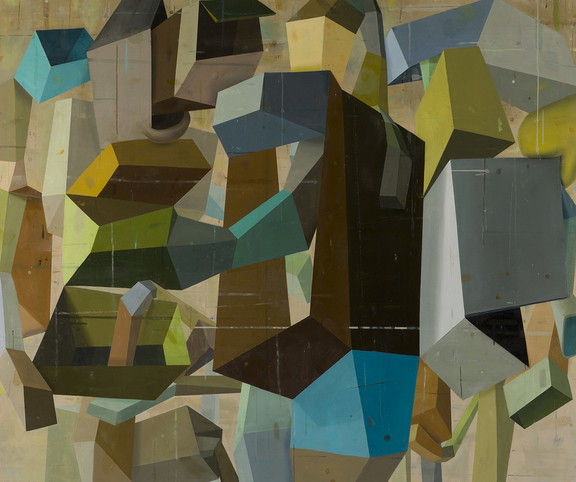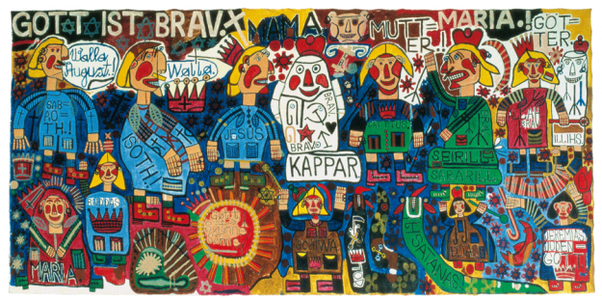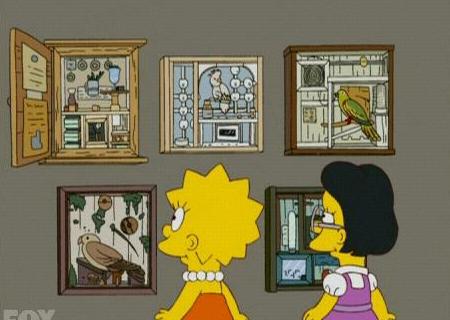|
Earth Room
In sleep I feared my soul would divide, range free, having shrugged off the body, go down to my basement where I once slept walked as a child, our official childhood photographs, tilted a nail’s width. My feet glided like that to the Earth Room, behind a nondescript door in Soho where an angel sat at a desk & pointed to the sign: no pictures, for aren’t angels always pointing at things and forbidding you to take them? The dirt was undulant, pure black, verdant, like Walter de Maria’s hair, filled a former gallery packed in since 1977 for me and this other guy to gaze at in awe and when I turned away I saw him wave to a man across the street in a window, just transferring things from box to box, exactly how my feet moved in sleep walk all hoard and squander crushed like thyme under each sole. You aren’t supposed to wake sleepwalkers, moving toward their sure destination, for the soul is shameless about orders. That dirt was dark as cake. Since the artist forbid reproduction I took a memory instead of you, love, smiling under a great stair. Merridawn Duckler Merridawn Duckler is a poet, playwright and prose writer from Portland, Oregon. Recent poetry in TAB: Journal of Poetry and Poetics, Fifth Wednesday Journal, Blast Furnace, Zone 3, The Psychoanalytic Review, The Meadow and Really System, forthcoming from Stonecoast Review, The Offing, Rivet, Nerve Lantern, Blue Lyra. She was runner-up for the 2014 poetry residency at the Arizona Poetry Center, judged by Farid Matuk. Her manuscript was a finalist in the 2016 Brooklyn-based Center for Book Arts contest. Recent prose in Poetica and humor in Defenestration. She was a finalist for the 2016 Sozoplo Fiction Fellowship. Her play in verse was in the Emerging Female Playwright Festival of the Manhattan Shakespeare Project. Other plays have been performed in Arizona, California, Nevada, Washington, Oregon and Valdez, Alaska. Fellowships/awards include Writers@Work, NEA, Yaddo, Squaw Valley, SLS in St. Petersburg, Russia, Berta Anolic Arts Fellowship to Jerusalem, others. She’s an editor at Narrative and at the international philosophy journal Evental Aesthetics.
0 Comments
Oil Wrestlers
Art is to resist time they say Ozymandias, but don’t believe in them, when the paint has turned pale, when the canvas got worn out, and the marble fragmented in a rough enough shake, neither Keats’s urn will remain, nor the three hunters in Bruegel’s picture in whom Berryman invests hopes, but if in case of a disaster there is a tiny little chance to survive: in Cemal Tollu’s picture, the two wrestlers, who look as if they’ve swallowed two anvils in place of shanks, and set to wrestling with concrete block bodies nailed with rancor into each millimeter square of the ground under their feet who knows with how much pressure so that they cannot be moved by a lift, seem to say: this life that slips away from our hands like muscles washed in olive oil is short but certainly long is Art. Nazmi Ağıl This poem is an author translation of a poem from his book, Yağmura Bunca Düşkün (So Fond of Rain) published in 2014. Nazmi Ağıl graduated from the English Language and Literature Department, Bosphorus University, Istanbul where he also received his PhD with a dissertation on Auden’s poetry. Since 2008 he has been working at the Department of English Language and Comparative Literature, Koç University. He published several volumes of poetry, and translated some canonical works from English literature including Beowulf, The Canterbury Tales, The Rape of the Lock and The Prelude. Musical Impressionism
(after Debussy, 12 Etudes For Piano) Book One 1) For Five Fingers Call up the smoke, slowly, conjure your hidden animal soul. Quick, this is an order, not a request (quit your giggling). It's serious, we can't have this silliness, there's too much at stake. Carve the smoke quickly with your tiny hands, make shadow cutouts, now. (It's not that I don't care for you, loving only your skilled fingers, your talented skin. No, but what I need now, today, are what they promise in the dark tent of this bed, where mysteries conspire and smoke rises from an invisible fire that can't warm either of us). Do it now. 2) For the Thirds Now, as the sun fights its way out of mist, an avian concerto moves me from sleep to waking. Already she has entered the day leaving a gap in the bed, sheets still kissed by her warmth. Perhaps, I think, I'll leap out of bed, catch her on the stairs and say-- Well, what I forgot to say. My body resists the impulse, the mind calculates that it will keep. This is a squall of loss, not a storm. She's not far away. 3) For the Fourths Away from this table, this pen, words carry different weights. Silence is not decoration there. Quick waterfall notes from birds are just and only that. Things aren't taught to mean beyond themselves. But right here, at this cloth covered table, the white field of a page demands thoughts that are near reality but not themselves real. That's not at all true, of course. I've heard such theories but disagree. It's not words reflecting facts, like a mirror, just a mute language, recoverable but concealed. 4) For the Sixths Concealed under clothes her form eludes words, both truth and lies. Her hair, at times a brown storm sometimes a dark helmet. Her eyes are more daunting than her shape, to words, at least. There's a place, the nape of her neck, that I never let escape my kisses, she's so tasty there. Often, never enough, I'll just drape an arm across her shoulder, aware of her quiet heart beat, her beauty, her soul, I suppose. I want her whole. 5) For the Octaves Holes punched in silence by birds and children; a patch of mist, forgotten by the sun. There's no balance to this morning. Diffused minutes, a fractured sequence of non-events. My patience tries to mend things, but is refused. 6) For Eight Fingers Refusing a smoke for now, I squat by the fire and ask for a story. Quick, with small words, like sparks flying from these logs. You start by lying, which I enjoy. I like stories tall in the woods, crackling with fire snaps. I bask yellow in the purple night. Start again. Now. Book Two 7) For the Chromatic Scale Three blackbirds smudge the sky like dotted notes. Nearby, a red car slides past a yellow house and down a blue hill, now quick, now slow, lost at last to distance and mist. The birds bank and wheel in careless formation, silent. 8) For the Ornaments Silent smoke brushes past late blossoms, the bough still damp from last night's all too rare rain. Fire is elsewhere, smoldering leftover from the last winter feast, perhaps, or imprisoned by a presence lamp in a cold church. The blossoms remain, tossed lightly by a breeze, teased and passed by confused birds, dazzled by the damp leaves. Clouds are forming, perhaps it will rain soon, but probably not. Each drop seems like the last that will ever fall. It grows dark but I leave the lamp alone, unlighted. Silence, I think is the main requirement. It allows one to reach past this melancholy drought, to cherish the damp brown earth, and to pray for rain. 9) For Repeated Notes Rain escaped again. Birds scatter like smoke in the gray light. I'd heard some storm was due, over due. Just words from an insane weatherman. That's the third day this week he's wrong. The ground's been stirred but stays thirsty. A moon dryly wanes, interred in a sterile sky. We've lamely entered dust's reign, with these damned cheerful birds. 10) For Opposite Sonorities Birds--gaps in silence--red and blue blurs in the leaves, more active than ear or eye, a distraction from her, a difference. She (ah, that sound) in her long languors, studies in blacks and browns, the gaps in her presence. I sit here, hunched over this long table, warming my hands above coffee, birds teasing my sight, turning her over in my heart, as if she were some image of woman not a woman herself. Then suddenly in the silence between two notes, like smoke, the broken icon is gone. 11) For Compound Arpeggios Gone, the mist has vanished from the small valley of this yard. Quick quiet notes, small stones under shoes next door form a gardener's minuet. I am thinking nothing at all (though I breathe her and live her I do not, always, think her) just letting the cool day rinse me, remake me, not even keeping watch. Silent. 12) For the Accords Silence, startled to waking, to music-- No, not birds, not now, at this time, this place. It's within her, as I make an ethic of our love. Wrongly, I know, face to face with myself over these words. I replace feeling with fiction, with mirrors and smoke. I cast shadow plays on the wall, then erase them before she looks, afraid they might evoke laughter, but lust, afraid of becoming a joke at this late date. Concealed somewhere by mists and evasions, there's a strongbox of words whose meanings I've forgotten. It resists me. But if it opened, if she just heard what I meant to say, now, she would be stirred and her enthusiastic hands would fall on to my hungry skin, light as a bird's note on an ear. Enough! I become small. I've learned enough to wait, to listen for a call. Mark J. Mitchell Mark J. Mitchell studied writing at UC Santa Cruz under Raymond Carver, George Hitchcock and Barbara Hull. His work has appeared in various periodicals over the last thirty five years, as well as the anthologies Good Poems, American Places, Hunger Enough, Retail Woes and Line Drives. It has also been nominated for both Pushcart Prizes and The Best of the Net. He is the author of two full-length collections, Lent 1999 (Leaf Garden Press) and Soren Kierkegaard Witnesses an Execution (Local Gems) as well as two chapbooks, Three Visitors (Negative Capability Press) and Artifacts and Relics, (Folded Word). His novel, Knight Prisoner, is available from Vagabondage Press and two more novels are forthcoming: A Book of Lost Songs (Wild Child Publishing) and The Magic War (Loose Leaves). He lives in San Francisco with his wife, the documentarian and filmmaker Joan Juster where he makes a living showing people pretty things in his city. It’s about two weeks from the 20 Poem Challenge.
There are no rules, aside from committing to trying to write a poem each weekday for twenty days, prompted loosely or intimately by the painting or visual artwork posted here every morning. Everyone and anyone can play. Just make the commitment to the 20 Poem Challenge. That’s it. Finish them, don’t finish them. Polish, or plow through. Abandon, or return late to nurture. It’s up to you and only you. I have carefully curated an intriguing array of artworks. I have included some of my known secret worlds, and I have pushed myself to think away from inclinations and preconceived notions and plans. I have included works that you will love and works that you will hate. The result is your September. The 20 Poem Challenge is a fun, creativity-generative project about jotting down words after thinking about the art. But the Challenge goes beyond fun, too, pushing you into some dark corners, getting you lost and keeping you out past your curfew. Writing is always therapy, of course, and looking at art and thinking about it is really a form of psychoanalysis, so it’s a month of discovery. Of the world around you, and about yourself. You owe me nothing and this challenge is about you, not me. But nonetheless, I do have something to ask of you. I want you to be as open and as expansive and as free as you have ever been. Dig deeper, or swim to the surface and survey the sky. Some of you are well known and some of you are unknown, and all of you will put that aside and try to write without any mooring whatsoever from your literary life -or lack thereof. I want you to lose your voice, and I want you to find it. I want you to play and to pray and put down the words that you’ve just never found so far. That Day in Assisi
Remember that dark, patched robe Held erect on some flimsy stand, its frayed edges on display in the Chapel of Relics, testament to the impoverished saint protected in the fortress basilica in Assisi? Or, maybe, not a robe robe but — what was that word? -- tunic or habit — though aren't those worn by nuns? — and wasn't it the key to his story, to the birth of his order, the foundation for this edifice, a monument to modesty? You, though, were drawn not to the long-dead saint's vestments, the supposed trace of his actual body, so small as to be startling; rather, your eyes led to the Upper Basilica and the frescoes that spoke of the world before the Renaissance as they told the lives of Christ and Saint Francis. I remember faint traces of some once regal blue in what is most likely Cimabue’s time worn Crucifixion, the Christ, Angels and followers faded to pale apparitions of the artist’s intent, while the people in Giotto’s Legend of Saint Francis — at least some attribute it to him, Cimabue’s student — appeared so crisp in their lines they seemed to represent a kind of contemporaneity to bring the life of Francis back alive when the work was new. And in your abstract painting, in which boxy shapes appear connected or open into one another, linked together, but without any clear beginning or end, I see the dull brown of Saint Francis’s habit and a rich blue hinting at either Cimabue’s or Giotto’s original intent, and still more colours, soft grays, tans, and greens as silent and somber as a chapel in the Lower Basilica in Assisi. Your painting moves, or at least the shapes and colours move the eye with a strong sense of momentum, even with abrupt changes in direction, suggesting there is no one definitive movement through the work, much like the questions raised by how we remember ourselves on that day in Assisi, in that ironic church — a glorious religious monument to a man, a Saint, whose life and order rejected such things -- a temple to memory in which the art has faded over time and has lifted a cloud of doubt of who exactly was the artist. Michael Janairo Michael Janairo is a former newspaper columnist and editor who now works at a museum in upstate New York, where he lives with his wife, son and dog. His writing has been published in various journals and anthologies, including Long Hidden: Speculative Fiction from the Margins of History, Star*Line Magazine, Eye to the Telescope, Kartika Review, Maganda Magazine, Walang Hiya: Literature Taking Risks Toward Liberatory Practice, and the Abiko Quarterly. His family name is pronounced "ha NIGH row." He blogs at michaeljanairo.com. |
The Ekphrastic Review
COOKIES/PRIVACY
This site uses cookies to deliver your best navigation experience this time and next. Continuing here means you consent to cookies. Thank you. Join us on Facebook:
Tickled Pink Contest
April 2024
|
